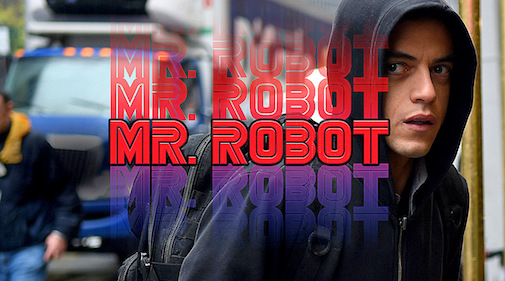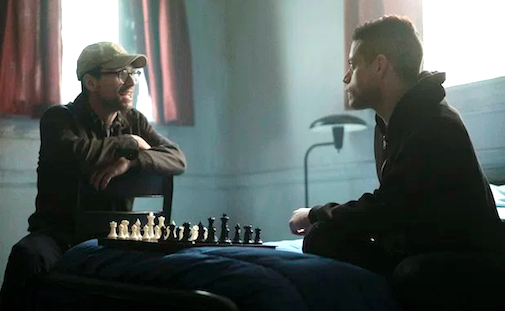USA’s Mr. Robot wrapped its second season this past week, just after star Rami Malek landed his first Emmy for best lead actor in a drama. The timing couldn’t be better: with the show already renewed for a third season, it should help maintain the buzz factor and maybe pick up more curious viewers.

And yet, among existing fans, season 2 has been remarkably divisive...
After a first season that, despite its share of unsettling moments, followed a comprehensible narrative and reached a much-anticipated climax, the show took a decidedly weirder and more circuitous path in its sophomore outing. With its slower pacing, disorienting time jumps, and cryptic encounters between characters whose motivations are most generously described as opaque, it seemed bent on making us second-guess our own understanding of what we were watching. The finale provided only partial answers to the questions that piled up over the course of the season, leading many viewers to feel they were being strung along with no visible payoff. FWIW, show creator Sam Esmail, who originally conceived Mr. Robot as a movie, envisions the series running four or five seasons, which may be too long for some.
I understand their frustration, but I don’t share it.

I’m in the minority that believes season 1 was slightly overpraised while season 2 is in danger of being underrated, and actually enjoyed the second season more than the first. Truth be told, I was never that invested in the hacktivist “revolution” against corporate capitalism or the 'is-Mr. Robot-real-or-not' mystery of season 1. While deftly executed, both plot lines seemed too much of a rehash of Fight Club. But what happens after the first stage of the revolution, and after Elliot (Malek) discovers Mr. Robot (Christian Slater) is his own imaginary alter ego? That interested me a good deal more. Because the fallout seemed likely to be much more complex than the build-up, I was willing to give the show plenty of latitude to develop the next chapter of the story.
And develop it did, in ways that sometimes perplexed but rarely failed to engage me. We see civilized order hanging together by fraying threads in the wake of the fsociety hack, and the unintended consequence of the poor and powerless being the hardest hit by the ensuing chaos. We learn more—but not too much more—about the mysterious Dark Army and its transgendered, time-obsessed leader, Whiterose (a fantastic B.D. Wong), whose agenda sometimes seems allied with fsociety and sometimes with fsociety’s chief target, “Evil” Corp, but is clearly in the ultimate service of her own larger, still-to-be-revealed goal. We meet FBI agent Dom Di Piero (Grace Gummer), methodically trying to unravel the fsociety hack even as outside forces continue to outflank her. We witness Elliot's unsuccessful attempt to eject Mr. Robot from his life and find out what happened to his missing partner in crime, Tyrell Wellick (Martin Wallström). (This struggle dragged on a shade too long, but did give us some of the season’s most arresting moments and more tour de force acting from Malek.) We also delve deeper into the equally damaged, if less obviously fractured, psyches of the two women closest to Elliot—his sister Darlene (Carly Chiakin) and childhood friend Angela (Portia Doubleday); Chiakin, in particular, does a great job showing the vulnerability and self-doubt beneath Darlene’s tough cyberpunk-girl exterior.
 There’s much to soak in, and it’s further enriched by the show’s gorgeous aesthetic. Visually and aurally (the use of music in this show deserves its own award), every scene is crafted to dazzle with its virtuosity or to keep the viewer slightly off balance, or both—whether it’s the seamless reveal shots of where Elliot’s really been for half the season, the stunning Dark Army ambush/assassination sequences, the nightmarish ’80s sitcom version of Elliot’s life story, complete with ghastly laugh track (reminiscent of the flashback scene in Natural Born Killers), or any & every appearance by the enigmatic Whiterose. If season 1 felt like a tribute to David Fincher, with an occasional nod to Kubrick and David Lynch, season 2 wasn’t afraid to go full-on Lynch, never more so than in the long, surreal interrogation of Angela in the penultimate episode. Set in a dark room lit like a stage, with a Commodore 64, a rotary phone, and a slowly draining fish tank as the main props, and a mini-me version of Angela and a disembodied voice on the phone as the main interrogators, it could be a scene right out of Mulholland Drive. It may have been the most alienating moment of the season for many, yet I found it fascinating.
There’s much to soak in, and it’s further enriched by the show’s gorgeous aesthetic. Visually and aurally (the use of music in this show deserves its own award), every scene is crafted to dazzle with its virtuosity or to keep the viewer slightly off balance, or both—whether it’s the seamless reveal shots of where Elliot’s really been for half the season, the stunning Dark Army ambush/assassination sequences, the nightmarish ’80s sitcom version of Elliot’s life story, complete with ghastly laugh track (reminiscent of the flashback scene in Natural Born Killers), or any & every appearance by the enigmatic Whiterose. If season 1 felt like a tribute to David Fincher, with an occasional nod to Kubrick and David Lynch, season 2 wasn’t afraid to go full-on Lynch, never more so than in the long, surreal interrogation of Angela in the penultimate episode. Set in a dark room lit like a stage, with a Commodore 64, a rotary phone, and a slowly draining fish tank as the main props, and a mini-me version of Angela and a disembodied voice on the phone as the main interrogators, it could be a scene right out of Mulholland Drive. It may have been the most alienating moment of the season for many, yet I found it fascinating.
The season wasn’t perfect. There’s a fair argument that Esmail, who also directed and wrote every episode of this season, got a little too self-indulgent with the cinematic flourishes, long beats, and non-linear storytelling. Even I didn’t love every subplot; as far as I can tell, Joanna Wellick’s still doesn’t seem to be going anywhere particularly interesting, and the FBI’s investigation, seemingly the season’s most conventional storyline, on closer reflection has serious logical flaws. And while I don’t mind waiting to learn the Dark Army’s endgame, I’ll be just as irritated as everyone else if it either turns out to be preposterous or is left unexplained. But for the time being, I’m content to enjoy the trip rather than worry about the destination.